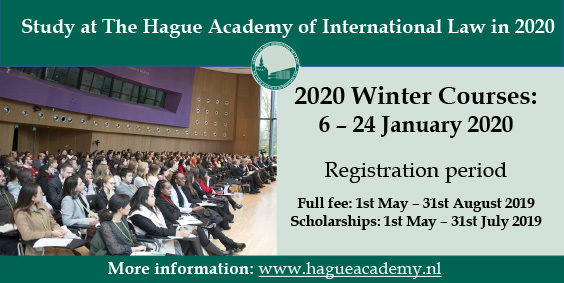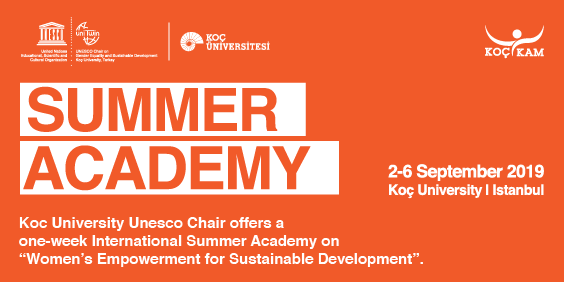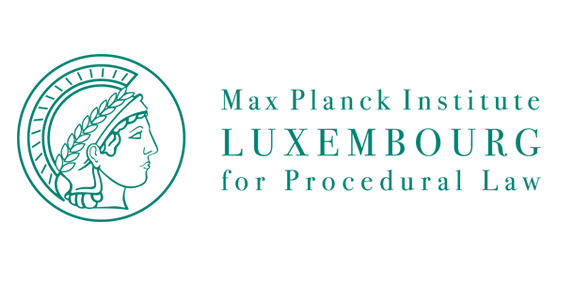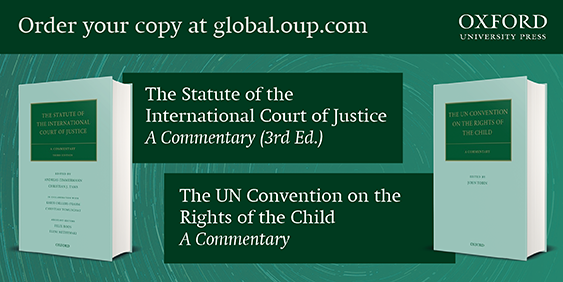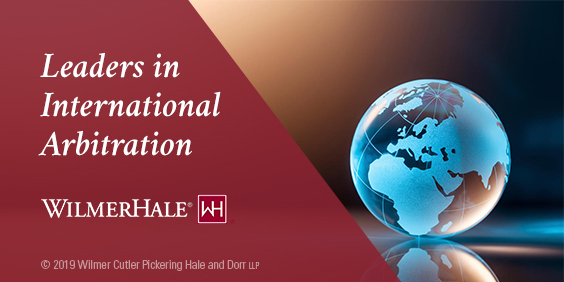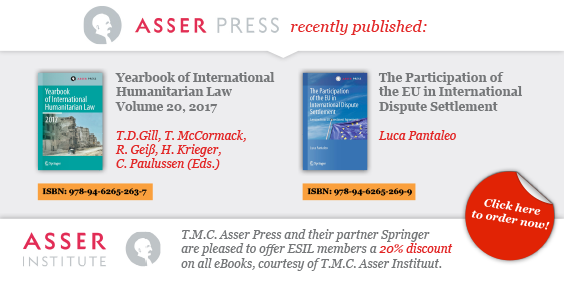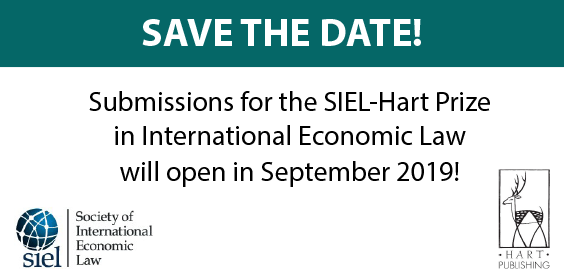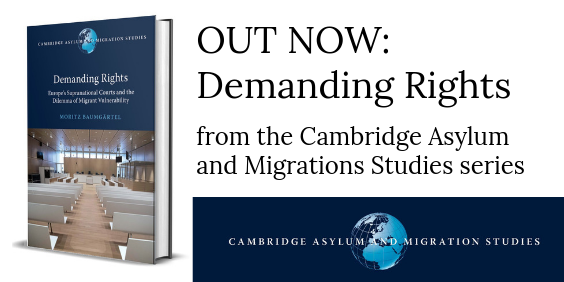ESIL Newsletter: June 2019
Editor: Pål Wrange (University of Stockholm)
 In this issue
In this issue
1. President’s Message: Sovereignty and Globalization

Luis M. Hinojosa-Martínez
The 15th ESIL Conference will take place in Athens from 12 to 14 September 2019. The subject of the Conference will allow for epistemological and theoretical discussions, as well as state of the art debates on migration, protectionism, non-state actors, environmental rules and the regulation of the cyberspace. These and other subjects are covered under the interesting overarching theme of the Conference: ‘Sovereignty: a concept in flux?’
A link can be established between the birth of the modern State, the elaboration of the concept of sovereignty and the emergence of liberal capitalism. Classical international law, articulated around the system of sovereign and independent states, allows the development of international trade and the arrangement of production factors in the most convenient way for liberal capitalism. The law is born exclusively from the will of the States and aims to provide legal certainty to transactions, which must be judged solely in terms of their legality.
Already in the twentieth century, the State responds to the revitalization of civil society through the hyperjuridification of social relations. The State regulates economic, political, social and cultural activities, providing security and predictability to these social relations. If sovereignty is not conceived solely as a fact, or as something exclusively political, but as a set of functions, it can be said that the social and democratic State governed by the rule of law expands the concept of sovereignty by multiplying the number of functions assigned to the State.
However, globalization substantially alters this framework. Interdependence among States is nothing new to international law scholars. Nevertheless, the acceleration of this phenomenon in recent years has overflowed the traditional clichés that explained in a more or less satisfactory way the limits to State sovereignty in international society. In fact, States have in practice lost some of the functions traditionally linked to this concept: the control of monetary and financial flows, environmental problems, management of information, and supervision of multinational companies. In this context, international cooperation appears as the only option for public authorities to continue guaranteeing a series of services that citizens demand.
The proliferation of international organizations helps States, but at the same time accentuates their loss of control of many of the functions that previously were considered essential attributes of state sovereignty. In such circumstances, it is most useful for the State to influence decision-making as much as possible within the appropriate international body, rather than defending the solitary exercise of fictitious powers that no longer belong to it.
Despite everything said above, the idea that globalization has destroyed the sanctuary of State sovereignty is false. There is currently no alternative to the State as a form of social political organization. In my opinion, it is necessary to recognize the survival of the sovereign State in international society for several reasons: first, the State continues to be the politico-social structure that best guarantees security to human collectives, both internally and against other States; second, the State provides a certain level of social solidarity, assuming a function of redistribution of wealth and provision of essential public services; third, State sovereignty allows countries to manage migratory flows at their borders and thus maintain their level of social welfare; fourth, States continue to be identified as a cultural and identity point of reference.
There exists no supranational structure capable of responding to global problems in substitution for States. Arguments denouncing the existence of an oligarchical international society or a de facto government of the great powers do not alter this conclusion. This reality has several consequences from a legal perspective. The most direct is that international law continues to be essentially an inter-state legal order based on consent. Today, the notion of sovereignty continues to be inextricably linked to the notion of State. The exercise of sovereign powers can be delegated to an international organization, but sovereignty itself is cannot be transferred (not even in the EU as Brexit is demonstrating).
Finally, I consider that the assertion of the survival of State sovereignty is of paramount importance not only for the understanding of the international legal order but from a political and social point of view. I agree with Chaumont when he pointed out 50 years ago that ‘la souveraineté est pour la nation ce que l’autonomie de la volonté et les droits de l’homme sont pour les individus. Rien ne peut remplacer la souveraineté tant qu’il n’y a pas de super-État mondial. Et en l’absence de ce dernier, l’abandon de la souveraineté ne peut signifier que la domination des forts sur les faibles’ (129 RCADI (1970 I) 25).
Let me finish with some information and a farewell. On June 14 we will hold the ESIL – CJEU Joint Symposium on ‘Adjudicating the International Responsibility of the EU’. Our Society is pleased to maintain this productive relationship with CJEU that allows a fruitful exchange between judges and scholars for the better understanding of this Court’s case-law. The farewell is that this is my last contribution to the Newsletter. It has been a privilege and a pleasure to serve the Society as President for the last two years.
I am looking forward to meeting you at a future ESIL event,
Luis M. Hinojosa-Martínez
hinojosa@ugr.es
2. Guest Editorial: Between hope and despair*

by Boldizsar Nágy
Commencement speeches are approaching (or have been delivered in previous weeks). Some of our students hope to become international lawyers after graduation. Should we encourage them? Let us look at international law in 2019!
Does international law bring order and predictability to international relations? It definitely does – to a certain extent. The bulk of the normative material, the invisible part of the iceberg, is still effective: most of the states, most of the time do not impose taxes above the agreed limits; diplomats enjoy and occasionally abuse their immunities; interstate borders are adhered to; intellectual property is respected and violators are held responsible; the list is endless.
International law is also instrumental in addressing global threats – threats that can only be contained and eliminated through collective action. Climate change is the biggest peril, and one which humanity has failed to prevent and now tries to limit and adapt to through worldwide co-operation (with a few very notable exceptions, to which I will return). There are also lesser evils that can only be defeated by collective action, ranging from terrorism to the deadly pollution of the oceans. The example of the Montreal Protocol on the protection of the ozone layer proves that addressing a global threat through collective action is possible.
But, as James Crawford observed in his Manley O Hudson medal lecture in 2012, the function of international law, namely providing a “normative structure for a rule-based system of international society”, is being tested, “possibly to destruction”.[1] What was true seven years ago is even truer today.
The visible part of the iceberg is melting away, the rules on the top of international law, rules concerning the use of force, respect for human rights, the duty of co-operation and peaceful settlement of disputes, and the equality of states are increasingly under attack. The fate of Iraq, Afghanistan, Ukraine, Syria, Yemen, the Democratic Republic of Congo, but also of Turkey and Venezuela show that the foundational rules are unable to constrain a range of destructive forces. Isolationism, withdrawal from collectively determined and co-ordinated action is spreading, be it the Paris Agreement and the ICC being left by the US, or the Global Compact on Safe and Orderly Migration being left by Hungary, yes, together with the US.
Is it déjà vu? Are we again leaving behind an era that, in the political North after 1945, was similar (with the exception of the cruel war in Yugoslavia) to that of the late 19th century, which Stefan Zweig described in the following way:
When I attempt to find a simple formula for the period in which I grew up, prior to the First World War, I hope that I convey its fullness by calling it the Golden Age of Security. … In its liberal idealism the nineteenth century was honestly convinced that it was on the straight and unfailing path towards being the best of all worlds. Earlier eras with their wars, famines and revolts were deprecated as times when mankind was still immature and unenlightened…
Do we still acknowledge liberal idealism after the bloodiest century in human history and when great powers openly discard international law as governing and constraining their actions? I, for one, do. The liberalism endorsed here may be called reflective liberalism. It still maintains that human equality, dignity and inalienable individual rights come first, and not states that claim to be the first. I still believe that rational discourse and legal argument should prevail over brute force. I trust that the students, who will pledge allegiance to international law, enter a profession that still promises to distinguish facts from fancies, truth from lies.
However, admittedly that liberalism must be reflective. Not only do we have to be aware of our history, cultural predisposition (and limits) and our tendency to universalise particular preferences — we cannot avoid the political.
“International law exists to advance the values, interests, and preferences that those in dominant positions seek to realise in the world” says Martti Koskenniemi.[2] But he adds that international law is also a platform giving voice to those, who are excluded from power, “a platform on which claims about violence, injustice, and social deprivation may be made.”[3]
So there is a choice: promote the hegemon or represent the voiceless.
[*] A longer version of this text was presented as a commencement speech to the LL.M. program in International Law of the Vienna University in 2018
[1] J. Crawford: International law as discipline and profession, 106 American Society of International Law, Proceedings. 2012, at p. 485
[2] M. Koskenniemi: What is International Law for? In: M. D. Evans (ed.): International Law Oxford University Press, Oxford, Fifth ed. 2018 at p. 47-48.
[3] Ibid, p. 28
3. 2019 Annual Conference

The ESIL@Athens2019 is now in full swing! It features a bustling academic programme with six fora and 12 agorae as well as a rich parallel programme organised by the ESIL Interest Groups. We are proud to announce that the Conference is now under the auspices of H.E. the President of the Hellenic Republic, Professor Prokopios Pavlopoulos, who will also address our opening ceremony and will host a welcome reception in the Presidential Palace.
Professor Yves Daudet will deliver the keynote address on ‘Sovereignty: The past and the future’ and the Conference will close with a round table discussion on the ‘Foundations of international law: The way ahead’, featuring Georges Abi-Saab (Geneva), James Crawford (ICJ), Anne Peters (MPI Heidelberg) and Catherine Redgwell (Oxford) with Professor L-A. Sicilianos, President of the European Court of Human Rights.
The full programme is now published on our website. Please, watch the space as new information is added almost daily. Places are filling quickly and the early bird registration has just finished: Please, register as soon as possible (here) to secure your participation as September beckons!
We look forward to welcoming you in Athens!
4. ESIL Reflections
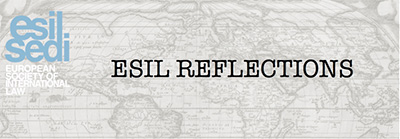
ESIL Reflections are short papers published on the website of the European Society of International Law (ESIL). ESIL Reflections offer up-to-date reflections on current issues in international law. The Reflections are now in their sixth year, covering a wide range of topics relating to current developments in international law and practice as well as theoretical reflections in a way that is relatively accessible to non-experts. The aim is to foster discussion between ESIL members and international law scholars and practitioners more generally – in Europe, but also beyond. ESIL Reflections are published online and distributed freely to ESIL members.
The editors are Federico Casolari, Patrycja Grzebyk, Ellen Hey, Guy Sinclair and Ramses Wessel (editor-in-chief).
ESIL Reflections are short papers (3000-4000 words) that argue one particular point that may trigger further debate in the scientific community. Extensive referencing is to be avoided. References are only necessary in case of direct citations or when new or less well-known works are mentioned.
 5. ESIL SSRN SERIES
5. ESIL SSRN SERIES
The SSRN Papers from the 2018 Annual Conference in Manchester (‘International law and universality’) are now available online.
The ESIL SSRN Paper Series features papers presented at ESIL Events (Annual Conferences, Research Forums, and Interest Groups events). Publication in the ESIL Series enables authors to disseminate their work widely and reach broader audiences without the usual delays involved in more traditional means of publication.
The current SSRN serial editors are Pierre d’Argent, Photini Pazartzis and Christina Binder. For further information or in case of enquiries please contact: esil.ssrn@gmail.com and pierre.dargent@uclouvain.be.
6. News from Interest Groups

ESIL Interest Groups are a vital part of the Society’s success and activities. A list of the groups is available on the ESIL website. Reports of recent activities and upcoming events are available in the full text of the Newsletter.
Prior to the ESIL Annual Conference in Athens, ESIL Interest Groups will organise pre-conference workshops to take place on the morning of 12 September 2019. Programmes for the following IG pre-conference workshops are now available and can be found on the ESIL IG webpages and on the Conference website.
Interest Group on Peace and Security
The IG on Peace and Security has two new convenors, Prof Ilja Richard Pavone and Dr Clare Frances Moran, who joined the continuing convenors, Prof Nicholas Tsagourias and Dr Paulina Starski, in 2019.
The committee held a workshop at the University of Gottingen earlier this year, entitled ‘The rule of law in cyberspace.’ The workshop was well-attended and attracted participants from European and international institutions. The new committee are in the process of arranging events for the next academic session.
To publicise our work, we have a new twitter account, @ESIL_IGPS, and a new website. The convenors are very keen to hear about the current and recently-published work of members. Please see our website for details on how to submit your work as a blog post, or to let us know about your recent publications. We can then list or link through to the work.
Interest Group on International Legal Theory and Philosophy
 The first conference launching the ESIL-IGITLP European Conference Series on the Theory and Philosophy of International Law was held 24–25 May 2019 at the University of Groningen.
The first conference launching the ESIL-IGITLP European Conference Series on the Theory and Philosophy of International Law was held 24–25 May 2019 at the University of Groningen.
The ESIL Interest Group on International Legal Theory and Philosophy and the ERC-funded TRICI-Law project co-organised a conference on ‘The Theory and Philosophy of Customary International Law (CIL) and its Interpretation’. The conference brought together over one hundred scholars to discuss a plethora of issues including the paradox of CIL, inductive and deductive methodology, the interpretability of CIL, relevance of hermeneutics, fiction, phenomenology and logic in interpretation, Schrödinger’s custom – dead and alive at the same time, and dimensions of temporality, among other relevant topics, with keynote delivered by H.E. Judge Pangalangan of the ICC.
